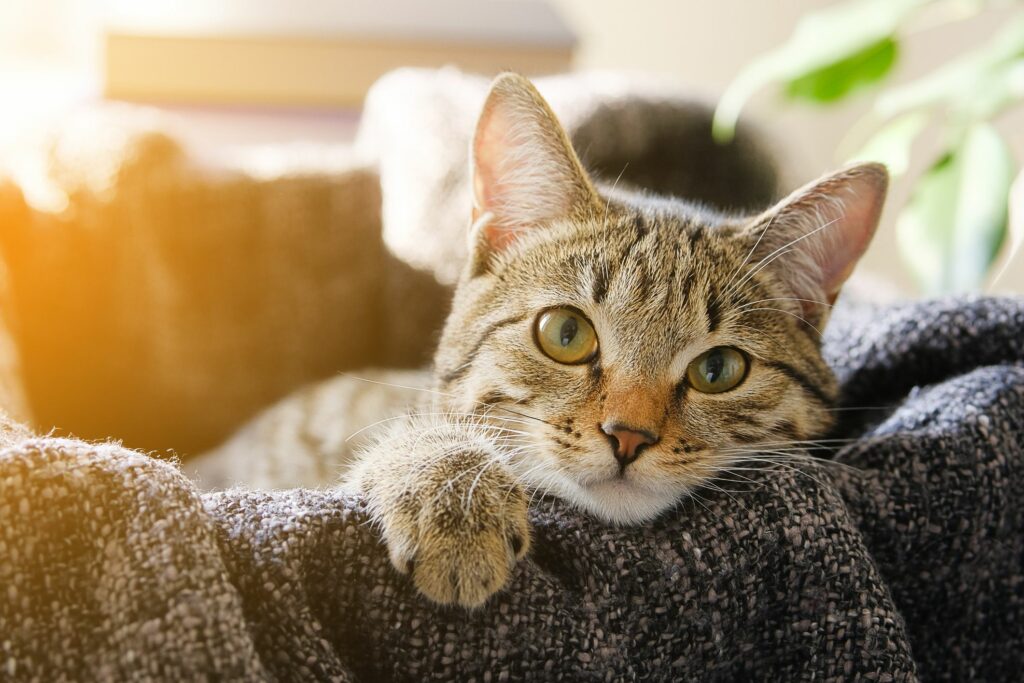Table of Contents
Dealing with a cat that sprays can be frustrating and challenging. Spraying is a common issue, especially in intact cats, and it can be caused by various factors including stress, marking territory, and medical conditions. This guide provides effective tips on how to stop a cat from spraying, helping you maintain a clean and stress-free home environment. Here are seven tips to help you address this behavior.

1. Understand the Reasons for Spraying
Understanding why your cat is spraying is the first step to addressing the behavior:
- Marking Territory: Cats spray to mark their territory and communicate with other cats.
- Stress and Anxiety: Changes in the environment, new pets, or unfamiliar people can cause stress, leading to spraying.
- Medical Issues: Conditions such as urinary tract infections or bladder problems can cause spraying. It’s important to consult a vet to rule out medical causes.
Identifying the cause helps tailor the solution to your cat’s specific needs.
2. Spay or Neuter Your Cat
Spaying or neutering is one of the most effective ways to reduce spraying behavior:
- Hormonal Influence: Intact cats are more likely to spray due to hormonal influences. Spaying or neutering reduces this behavior significantly.
- Behavioral Benefits: Many cats show a decrease in spraying and other territorial behaviors after being spayed or neutered.
- Health Benefits: Spaying or neutering also provides health benefits, reducing the risk of certain cancers and other health issues.
Spaying or neutering can drastically reduce the likelihood of spraying.
3. Provide a Stress-Free Environment
Reducing stress in your cat’s environment can help prevent spraying:
- Safe Spaces: Create safe spaces where your cat can retreat and feel secure.
- Routine: Maintain a consistent routine for feeding, playtime, and interaction to provide stability.
- Calming Products: Use calming products such as Feliway diffusers or sprays to help reduce anxiety.
A stress-free environment helps prevent stress-related spraying.
4. Clean and Remove Odors Thoroughly
Properly cleaning sprayed areas prevents re-marking:
- Enzyme Cleaners: Use enzyme-based cleaners to break down urine proteins and eliminate odors completely.
- Avoid Ammonia: Avoid using ammonia-based cleaners, as they can mimic the smell of urine and encourage more spraying.
- Frequent Cleaning: Clean sprayed areas thoroughly and frequently to prevent your cat from re-marking the same spots.
Thorough cleaning removes the scent markers that encourage your cat to spray again.
5. Address Territorial Issues
Minimize territorial disputes to reduce spraying:
- Separate Resources: Provide separate feeding areas, litter boxes, and sleeping spots for each cat in a multi-cat household.
- Gradual Introductions: Introduce new pets slowly and carefully to minimize stress and territorial disputes.
- Vertical Space: Increase vertical space with cat trees and shelves to allow cats to establish their own territories.
Addressing territorial issues helps reduce stress and prevent spraying.
6. Use Behavior Modification Techniques
Behavior modification can help change your cat’s spraying behavior:
- Positive Reinforcement: Reward your cat for using the litter box and for calm, non-spraying behavior.
- Distraction: Redirect your cat’s attention with toys and interactive play to prevent spraying.
- Training: Use clicker training to reinforce desired behaviors and discourage spraying.
Behavior modification helps your cat learn appropriate behaviors and reduces spraying.
7. Consult a Veterinarian or Behaviorist
If spraying persists, seek professional help:
- Veterinary Checkup: Schedule a checkup to rule out medical causes of spraying.
- Animal Behaviorist: Consult an animal behaviorist for specialized advice and behavior modification plans.
- Medication: In some cases, your vet may recommend medication to help manage stress and reduce spraying.
Professional help provides tailored solutions to address persistent spraying behavior.
Conclusion on How to Stop a Cat from Spraying
Addressing spraying behavior in cats requires understanding, patience, and the right strategies. By following these tips on how to stop a cat from spraying, you can reduce and prevent this behavior, creating a cleaner and more harmonious home environment. Understand the reasons for spraying, spay or neuter your cat, provide a stress-free environment, clean thoroughly, address territorial issues, use behavior modification techniques, and consult a professional if needed. For more information on managing cat behavior, visit the ASPCA and Humane Society.
FAQs on How to Stop a Cat from Spraying
Why is my cat spraying indoors?
Cats spray indoors for various reasons, including marking territory, stress, anxiety, and medical issues. Identifying the cause helps address the behavior effectively.
Will neutering my cat stop spraying?
Neutering can significantly reduce spraying behavior, especially in male cats. It decreases the hormonal drive to mark territory.
How can I clean areas where my cat has sprayed?
Use enzyme-based cleaners to break down urine proteins and eliminate odors completely. Avoid ammonia-based cleaners, as they can encourage further spraying.
What can I do to reduce my cat’s stress?
Create a stress-free environment with safe spaces, consistent routines, and calming products like Feliway diffusers or sprays.
How do I address territorial disputes in a multi-cat household?
Provide separate resources for each cat, introduce new pets gradually, and increase vertical space to reduce territorial disputes.
When should I seek professional help for my cat’s spraying behavior?
If spraying persists despite your efforts, consult a veterinarian to rule out medical causes and seek advice from an animal behaviorist for specialized behavior modification plans.











